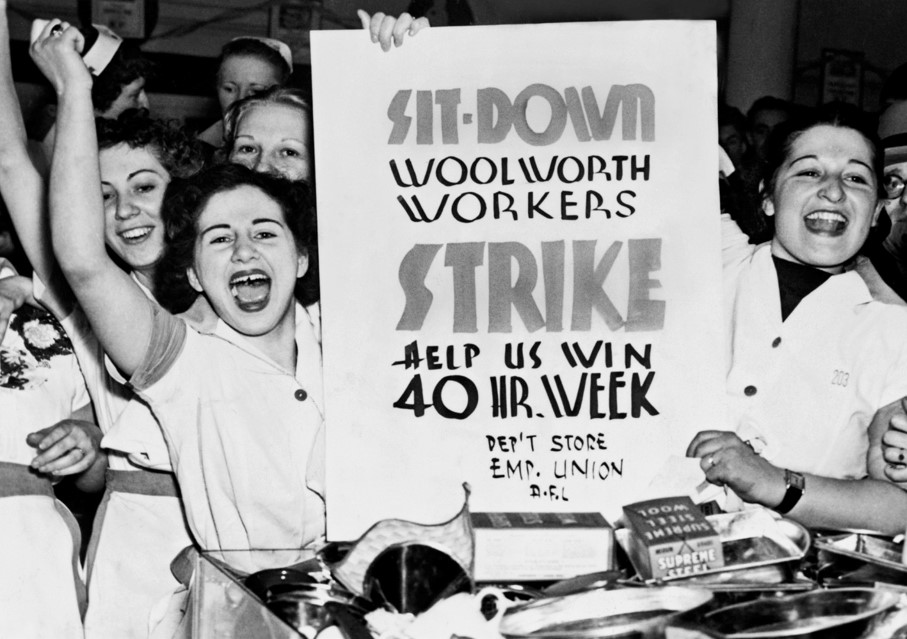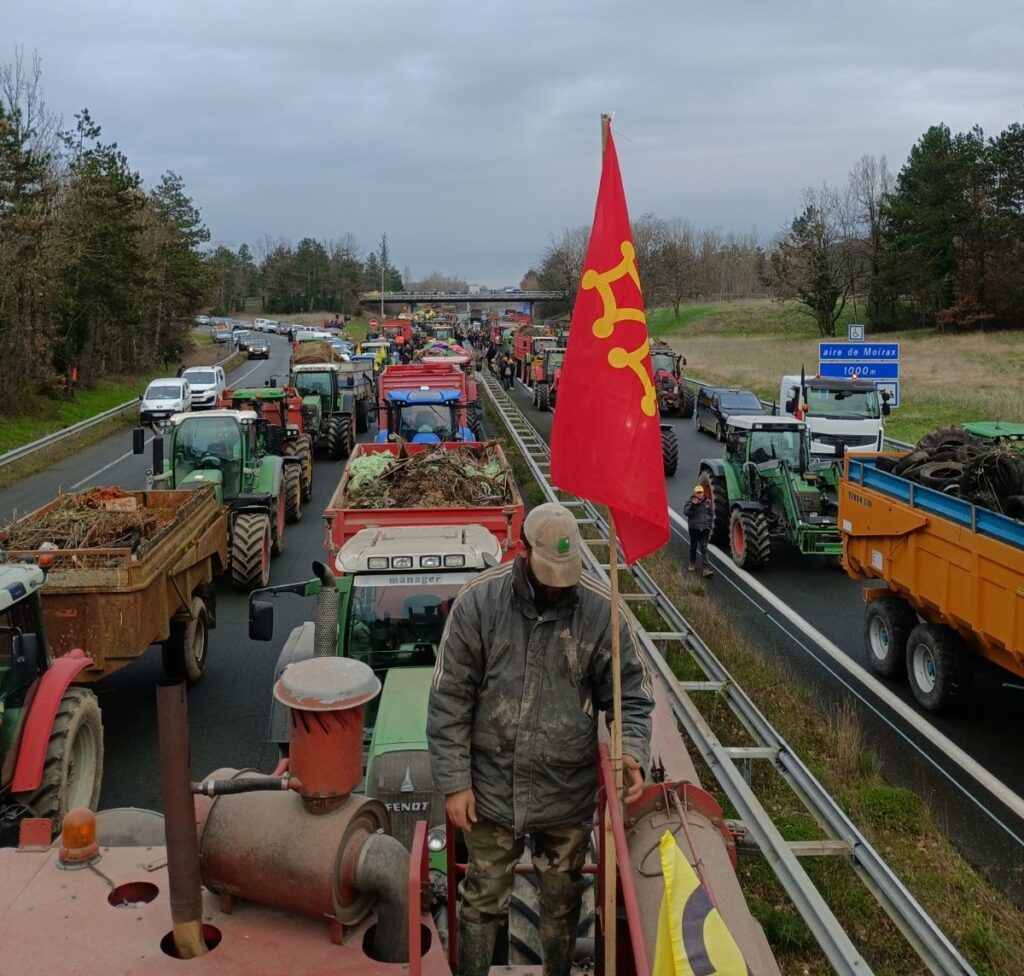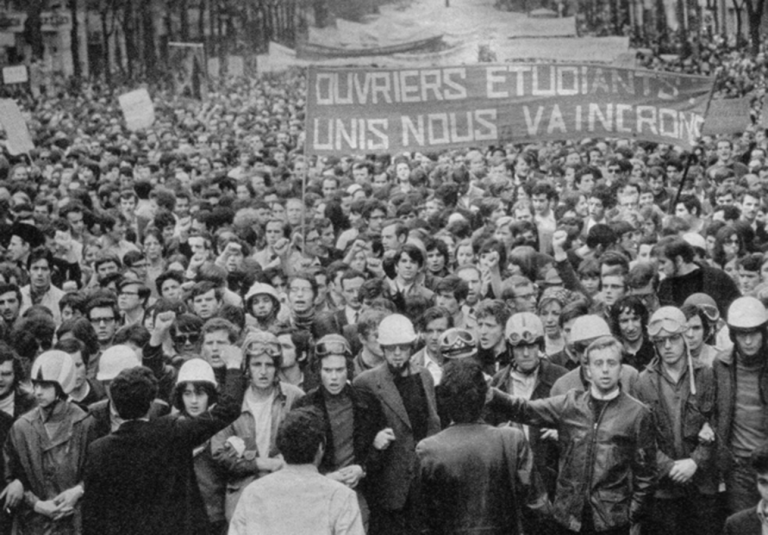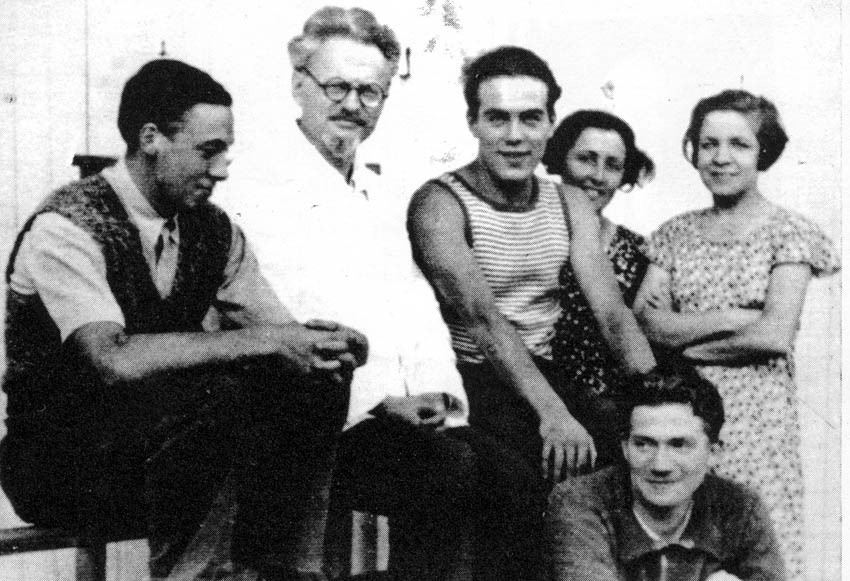Part Two – Workers’ control, peasant farmers, the need for class struggle.
This following text is the second part of a speech made to the National Confederal Committee (NCC) of the CGT labour confederation in France, held on the 18th and 19th March 1935, written by Leon Trotsky.
As a refugee in France at the time, Trotsky was forbidden to intervene in French politics. Alexis Bardin, a supporter of Trotsky’s ideas from Isere, used his platform on the NCC to present Trotsky’s criticisms of CGT policies. [Part One of the speech can be read here – the featured photo shows Trotsky with his friends, family and supporters in France]
We believe that this speech very clearly draws a distinction between the clear socialist analysis of society, leading to the need for socialism to replace capitalism, with the more muddled ideas of those on the left who promote policies that only seek to make improvements within capitalism.
Of course, Marxists are fierce fighters for every single reform, no matter how small, but we recognise that capitalism, because of its essential structure and workings, cannot deliver the basic demands of working people on a long-term basis. We, therefore, clearly raise the need to end the control of the capitalist class over society and the state.
This second half of the speech focusses on issues of workers control, the 40-hour week and the needs of peasant farmers. Of course, farmers make up a dramatically smaller percentage of the population today than they did in the 1930s, but as recent protests in France have demonstrated, these issues are still relevant. The labour movement needs a raft of policies to win the support of farmers, the self-employed and small-business owners. Trotsky saw the necessity of this.
Some very specific and topical references from the time it was written have been edited out, shown by […] and crossheads (subtitles) added for ease of reading.
************
Part Two
The plan speaks, albeit rather briefly, of workers’ control […] In Isère, we are staunch advocates of workers’ control. We often meet this objection: “Control is not enough. We want nationalization and workers’ management” However we do not in any way counterpose the two slogans. For the workers to take over the administration of industry — which is absolutely necessary, and as soon as possible, for the well-being of civilization — we must immediately demand workers’ control, as well as peasant control over certain banks, the fertilizer trusts, the milling industry, etc.
For nationalization to operate in a revolutionary way, not bureaucratically, the workers must participate at every stage. They must prepare themselves for it, beginning now. They must intervene, beginning now, in the management of industry and the entire economy in the form of workers’ control, beginning with their factory.
The plan envisages this control in a class-collaborationist form, by subjecting the workers’ representatives to the majority control of the bourgeoisie […] Moreover, it stipulates that the delegate from each category of producers must be nominated by the “professional organization.” We cannot accept that proposition. Our trade unions, unfortunately, encompass only a twelfth or a fifteenth of the wage force; the union is not an end in itself; its mission is, on the contrary, to draw the mass of workers into the administration of public affairs.

1937
The strike will benefit the workers, organized or not, only on condition that the trade-union vanguard draws the entire mass into action. For workers’ control to be effective, the same condition is fundamental. That is why the control committee in each plant must not be composed only of delegates from the trade union, that is, from a fifteenth of the workers. No, it must be elected by all the workers in the plant, under the leadership of the union. That would be the real beginning of free and honest workers’ democracy, in contrast to bourgeois democracy, which is corrupt to the core.
The plan calls for the application of the forty-hour week with no reduction in wages. There can be no debate about that slogan. But we know only too well that the ruling class and its state are turning in the other direction, that is, they want to lower wages without reducing the number of hours of work. What means, then, can we use to achieve the forty-hour week? […]
[…A]ll workers, even the most simple-minded, understand very well the advantage of the forty-hour week with no reduction in wages. What they are waiting for from the CGT is its indication of the means by which this slogan can be implemented. But it is precisely here that the great weakness of the plan begins: it makes proposals; it offers suggestions; it formulates slogans; but it is completely silent on the means of fulfilling them.
The ‘peasant’ question
However, before passing on to the question of how to fulfil the plan, we must pause on a particularly serious question: the peasant question. Everyone talks about it, everyone proclaims the necessity of improving the situation of the peasants, but there are lots of rogues who would like to prepare an omelette for the peasants without breaking the eggs of big business. This method cannot be ours […]
It is all very well to say: “The peasants must be freed,” but you know very well that the peasant does not like vague and platonic formulations. And he is damned well right! “Must be freed.” But how? Here is the only possible reply: We must expropriate and nationalize the fertilizer and milling trusts and put them truly at the service of the farmers and the consumers. The peasants cannot be aided without going counter to the interests of big business.
The plan speaks of the “general reorganization of agricultural production,” but it does not specify the direction or the methods of this reorganization. The idea of expropriating the peasants or violently forcing them to take the road of socialist production is so absurd that it is scarcely worth the trouble of criticizing; no one, moreover, is proposing any such measures. The peasantry itself must choose the road of its salvation. Whatever the peasants decide, the proletariat will promise its sincere and effective support.

{photo – wiki commons images)
The peasant cooperatives are the most important means to allow the freeing of agricultural economy from the excessively narrow partitions of the agricultural plot. The commentaries on the plan say: “Peasant cooperatives for production, stockpiling and sales must be encouraged and helped.” Unfortunately, we are not told by whom and how they must be encouraged and helped. At every stage we find the same failing. The demands of the plan often have the appearance of dead letters.
Who is it who will nationalize the banks and the key industries? Who will come to the aid of the peasants and introduce the forty-hour week? In one word, who will apply the program of the CGT? Who and how? This question, comrades, is decisive. If it remains unanswered, the whole plan remains hanging in the air.
In the paragraph on “Industrialized Nationalizations,” we find in passing an indirect and completely astonishing reply to the question at hand. Here is how the very objective of the plan is defined in that paragraph: “It is a question of establishing […] the technical details of a program that can be applied independently of the political regime.”
One can’t help rubbing his eyes once or twice on reading this unreal formulation. So, the plan that is to be directed against the bankers, the magnates of the trusts, against the ninety dictators of France and the colonies — the plan that is to save the workers, peasants, artisans, small businessmen, employees and civil servants — this plan would be independent of the political regime?
To put it otherwise, the rudder of the state can remain, as it is presently, in the hands of the exploiters, the oppressors, those who starve the people — no matter, the CGT presents this government with its plan of economic renewal? Let us say it frankly and openly, this supposed independence of the plan with respect to the political regime totally destroys its real worth by placing it outside the social reality.
Which class holds state power?
Naturally, at this moment we are not concerned with the constitutional or bureaucratic forms of the state regime. But one question dominates all others: which class holds the power? […] He who holds the power decides the forms of property, and all reform reduces itself in the last analysis to the abolition of private property and the establishment of collective or socialist property in the means of production.
He who believes that the bourgeoisie is capable of expropriating itself is perhaps an excellent poet. But, for my part, I would not entrust him with the funds of the smallest trade union, because he is living in a dream world while we want to remain in the real world.
It must be said in no uncertain terms: only a revolutionary government of the workers and peasants, prepared for implacable struggle against all the exploiters, can apply the plan, complete it, develop it and go beyond it along the socialist road. For the proletariat, that means to conquer power.
[…] The official statement tells us that the plan launched by the CGT must be “met favourably by the general public.” I ask you, comrades, and I ask myself: what does that mean, the general public? It is not, I suppose, the public of the great boulevards. In the trade-union movement and the social struggle, we are used to first seeking out classes: the proletariat, the bourgeoisie, the different layers of the petty bourgeoisie.
We are certainly hopeful that the proletariat and the lower layers of the petty bourgeoisie will accept the plan favourably, provided it is elaborated carefully, purged of equivocation and presented to the masses as a program of struggle. But the workers and poor peasants are not the general public. Do we mean, for example, that it is the big bourgeoisie who must accept the plan of the CGT? Obviously not, we don’t want to make fun of ourselves. […]
Is collaboration possible with this bourgeoisie that now, taking inspiration from the ancien régime, prepares to outlaw any workers’ association? To pose this question is to reply to it. Nothing remains but implacable struggle, and to the very end.
The observations, criticisms and suggestions that I am presenting here in the name of our departmental union are already quite extensive, and I am, unfortunately, far from having exhausted even the most important questions. It’s all the more necessary, therefore, to indicate the fundamental defect of the plan: its authors wish to place themselves above classes, that is, outside reality.
Where they want to win over everyone, they speak of the general public. They want to nationalize the banks, but without prejudice to high finance, and to nationalize the trusts, while luxuriously guaranteeing the big bourgeoisie three more generations of parasitism. They want to come to the aid of the peasants without violating the interests of the landlords, the fertilizer trusts and the big milling companies.
They evidently also want to win over all possible political regimes since they state that their plan is neutral with respect to political parties and even regimes. It even seems to me that such laboured and incomprehensible expressions as “industrialized nationalizations,” etc., are chosen in order not to shock the delicate ears of the magnates of the trusts.
Useless, dangerous, pernicious
This procedure is not only useless, it is dangerous; it is not only dangerous, it is pernicious. He who seeks to embrace too much grasps poorly or carries away little. We will not win over the bourgeoisie — it has an unshakable class consciousness; it makes fun of our advice; it is preparing to crush us. The more gentle, conciliating and obsequious we are toward the bourgeoisie, the less it respects us and the more intransigent and arrogant it becomes. This lesson, it seems to me, emerges from the entire history of the class struggle.

Class struggle is the key!
On the other hand, by running after the supposed general public with our entreaties and by making concession after concession to appease the capitalist idol, we risk displeasing the underprivileged who are already beginning to say to themselves: “These are advisers of the ruling classes and not the leaders of the oppressed classes.”
We will never win the heart of the class enemy, but we risk losing permanently the confidence of our own class. The misunderstanding of this fundamental rule constitutes the main weakness of the plan. We must reshape it We must address ourselves directly to the wage earners and the exploited. We must use clear and firm language. We must transform the plan into an action program for the entire proletariat.
The “notes for propagandists” enjoin us to “crystallize all those of goodwill.” This is vague. Where are they to be found? We are acquainted with classes and class organizations, but above all we know the bad will of the bourgeoisie. To smash it we must counterpose the revolutionary will of the working class. As for the middle classes, they will put their confidence in the proletariat only if the latter demonstrates in action its confidence in itself.
It is absurd and even criminal to look for goodwill in the bourgeoisie by breaking down and paralyzing the revolutionary goodwill of the proletariat The united front of our class is necessary at any cost: unity of action of all the workers, trade-union, political, cooperative, educational and sports organizations and, in the first place, trade-union unity, with a specific goal — the application of the plan for nationalization and socialization through the conquest of power.
We must mobilize all the real worker militants for a vigorous campaign throughout the country. The peasants in the most distant hamlets must be convinced that the proletariat is this time seriously getting ready to overthrow the bourgeoisie, to take the power into its hands to transform our country, to make it habitable at last for the working people.
Either the plan is transformed into a plan for the conquest of power by the proletariat, for the establishment of a workers’ and peasants’ government, or the people will put it down as null and unworkable. The departmental union of Isère is for revolutionary action. If you call on us in that sense, we will respond: Present!



